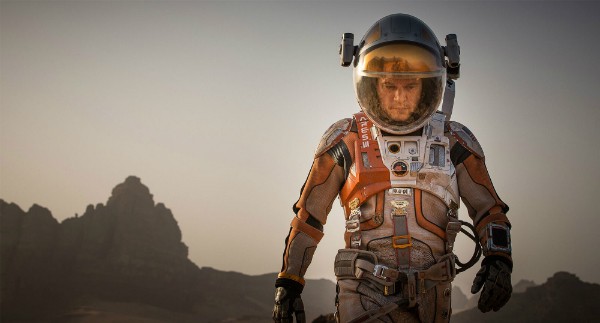
The Martian (based on Andy Weir’s novel), stars Matt Damon as Mark Watney, an American astronaut whose crew accidentally leaves him behind after an emergency evacuation. Believing Watney dead, the crew rocket back towards Earth leaving him unconscious and running out of air on the surface of Mars. When Watney awakens, things couldn’t get any worse: He has no way of communicating with NASA or his crew, and not enough food, water, or oxygen to sustain him even if a rescue mission could be mounted. Armed only with the leftover remains of past missions — and science — Watney must figure out how to survive on a planet inhospitable to life.
The Martian features a wonderful ensemble cast, but this movie belongs to Matt Damon; Mark Watney is the beating heart of the film. Damon plays the role with an indomitable sense of humour but always makes it clear that Watney is a scientist through and through. The film quickly falls apart if Damon can’t believably sell the character’s enthusiasm for the scientific method. Watney constantly expresses the unbridled passion that drove him to reach the one percent of the one percent of geniuses who qualify for NASA. Scott keeps the narrative flowing by having the isolated Watney chronicling his experiments in video journals. The video journals don’t feel like a cheap contrivance meant to keep Damon speaking to the audience, it’s something that a science-nerd like Watney would do. Watney’s affability carries the film for long stretches, and also makes it all the more soul-crushing when the crack’s in his resolve finally begin to show. Damon nails his performance with the skill and confidence of an actor that will be snatching best actor nods during the coming awards season.
Damon’s strong performance is complimented by the film’s large supporting cast. The Martian’s casting-director packed the movie with overqualified actors who signed on to do spot duty. It’s a testament to Scott’s direction and Drew Goddard’s screenplay that the film extracts phenomenal performances from an ensemble of actors that are essentially slumming it. Jessica Chastain, Michael Peña, Kate Mara, Sean Bean and Kristin Wiig are all headliners who bought into The Martian’s script — eEach one sacrificed more screentime and a bigger pay day to be part of something memorable.
The Martian offers the perpetually underutilized, Chiwetel Ejiofor, a platform to deliver some fine work. Upon realizing that Watney is still alive, the NASA team back on Earth start facing a series of increasingly difficult decisions. Ejiofor’s Vincent Kapoor is the liaison between Watney and the rest of the world (including the space program bean counters). Kapoor must act as the first line of communication with someone he views as a dead man walking. The chain of command won’t allow Kapoor to speak freely, and Ejiofor ensures the audience has a sense of his frustration. Few actors are as capable of conveying sympathy and compassion without saying a word. Ejiofor makes the audience believe that his correspondence with Watney is a heavy burden weighing on his soul. Kapoor feels as though he carries the weight of the world upon his modest shoulders and it’s a treat to watch how skillfully Ejiofor conveys that emotional exhaustion.
The film casts Jeff Daniels as Teddy Sanders, the closest thing The Martian has to a villain. Sanders is the ultimate pragmatist, he’s constantly calculating the insurmountable odds of rescuing Watney against the financial cost and the hits to public perception. Sanders reasoning is always logical and his thought process makes for interesting philosophical debates. Donald Glover creeps into the film and steals a few scenes as an astrodynamics Savant with an odd personality. The Martian does a magnificent job of breaking the stereotypes of geniuses having to be awkward, so it’s disappointing to see Glover doing the oddball shtick — it’s a nitpick.
The Martian makes science sexy. All the characters are certified geniuses, and with the exception of the borderline autistic Donald Glover, the characters are never maladjusted or singled out for their intellect; their smarts are just a given. The Martian presents a group of people who are the best in the world at what it is they do, the film gives them an escalating series of problems, and they put their big beautiful brains together and figure them out. They are cool, confident, and successful men and women; the way they use their brains to solve problems will make a generation of children want to join space camp the way that Teenage Mutant Ninja Turtles made kids want to learn kung-fu.
The Martian is jaw-droppingly gorgeous. Scott’s films Alien and Blade Runner literally defined the look of modern day sci-fi. Four decades later, Scott remains a visionary director at the forefront of visual effects in film. In The Martian, Scott seamlessly integrates CGI and practical effects to the point where even film buffs must squint and pause the movie to see where the two meet. Over the years, countless movies have taken place on Mars but never has any film depicted the planet with the majestic splendor of The Martian. The film’s pristine aesthetic is also enhanced by 3D that is worth tacking an extra $3 onto the price of a ticket. Scott puts his 3D lenses to work, applying an immersive depth of field which serves as more than just window dressing.
In a broad sense, science-fiction is an extraordinary way to share basic human stories. The Martian is the best kind of sci-fi story, one with relatable emotional themes wrapped up in space suits, techno jargon, and rocket ships. This is a movie meant to wow the eyes and inspire the mind in equal measure. The Martian is thrilling, laugh-out-loud funny, visually stunning, heartbreaking, and life affirming. The Martian is a science-fiction masterpiece. Go and see it.




